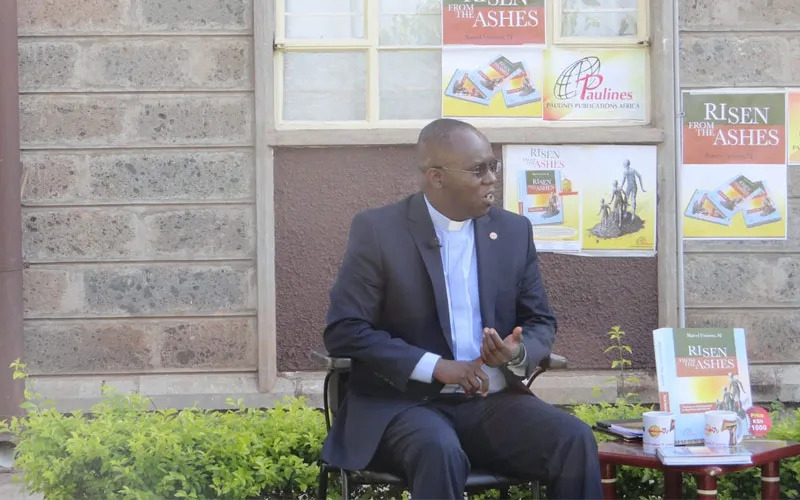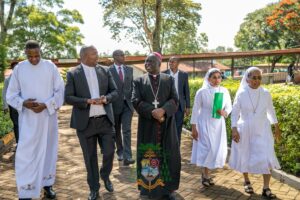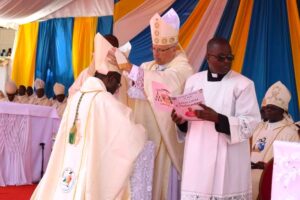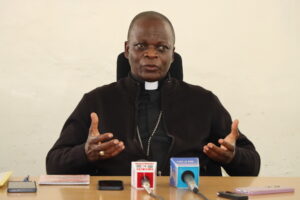KENYA: “If you are not Ready to let go and Forgive, you are a Prisoner,” says Rwandan Cleric in a New Book “Risen from Ashes”

Fr. Marcel Uwineza
Sr. Jecinter Antoinette Okoth, FSSA
In his new book titled, “Risen from the Ashes: Theology as Autobiography in Post-genocide Rwanda,” Fr. Marcel Uwineza who witnessed the 1994 Rwanda genocide in his young teen has accentuated that forgiveness is the way to go in life.
Speaking about his life experience and the aftermath of the genocide during the book launch that was broadcast on Capuchin TV, Kenya on Friday, January 13, Fr. Uwineza, a member of the Society of Jesus (Jesuits), narrates the significance of conversion and reconciliation whose result can be incredible.
“Forgiveness really means many things, but for me it is a miracle and in the language of some scholars, it is really doing the unimaginable, the impossible,” Fr. Uwineza shared and continued, “Forgiveness can have several dimensions: self-forgiveness and forgiving others being mindful that the other person might not even come for forgiveness.”
He recounts his journey of genocide survival and points out that “Forgiveness is a decision empowered by God,” while reminding members of the society that “when you are still unable to forgo, or to let go, you is a prisoner.”
Fr. Uwineza the Principal of Hekima University College in Kenya lost his parents and three siblings during the war yet in his lifetime, he has dined with the man who killed his siblings and who later asked for forgiveness.
Asked during the Friday interview what it takes to make such a challenging decision to forgive, embrace and dine with the person who murdered his family members and exhumed the remains of his father, the cleric who doubles as Formation Assistant to the Major Superiors of the Jesuits of Rwanda-Burundi disclosed his recognition that humanity is prone to sin and its through God’s forgiveness that he has another chance.
“Realizing from a Christian perspective that we are all sinners, God knows how many times I have been given a second chance and so it is time to reciprocate the forgiveness I have received,” he narrated the inspiration to forgiveness adding that being in a Religious Order founded by St. Ignatius of Loyola “I have done the spiritual exercise of St. Ignatius which set me on a journey of interior freedom.”
In fact, he expounded further, “The heart of spiritual exercise of St. Ignatius of Loyola, is the invitation to really put order in one’s inordinate affection. So when I did these spiritual exercises and remembered the meditations and contemplations…these helped me to deal with my past, I would say, to put order to heal.”
According to Fr. Uwineza, the former Dean of the Jesuits school of Theology, his painful narrative of forgiveness did not only free the man who killed his siblings and later asked for forgiveness, but the action also set him free.
“My novice master sent me back home for some great days for holidays, and providentially I met the man who killed my siblings and exhumed the remains of my father,” the Rwandan cleric recounts the encounter with the killer and how he forgave.
“I met the man at the graveside of my siblings, he had been released from jail. He knelt down and looked at me and said Marcel you know what I did, if you have a space in your heart forgive me,” Fr. Uwineza recalled the conversation and added, “Mind you at that moment one was wondering, does he mean it, it sounded like a movie.”
The step the author of the book took he said, was invaded by something higher explaining that, “I asked him to rise, and then we embraced one another. At that moment I felt that the chains have been broken from my legs, like I too who had been in prison was set free.”
“So I took him to a nearby pub, we had a drink, shading tears, it was a moment in my life that I will never forget, so forgiveness set you free,” the priest disclosed.
According to the author of “Risen from Ashes,” he was moved to write his personal experience about the genocide in Rwanda so as to inspire people in various ways.
“There are several reasons behind the writing of this book. I come from a country that has had several wounds and so when I was growing up, I had this terrible experience of the genocide against the Tutsi in Rwanda but then I have been privileged to have the opportunity to advance in studies through the Society of Jesus,” Fr. Uwineza said adding that after extensive prayers it was time to pull down what he studied and look back into life on how he could tell his story in a more meaningful, rational and unbiased way that can be of help to others.
Consequently he acknowledged that many people from his country have lost their voices, and they do not speak hence writing the book will help “lend a voice to so many people who died, who can’t speak to date about the genocide and the aftermath of the genocide. This is my voice to so many who have been voiceless.”
Fr. Marcel the former Assistant Director at the African Jesuit AIDS Network who has narrated his story after an invitation to the United States says the book will also “help people to understand who the human person is and what we are capable of doing, especially when you go to the third chapter on the pain of Rwanda, but also the hope that has sprung, that someone can still speak about God even when they are risen from the ashes.”
On his part Bishop Emeritus Rodrigo Mejía Saldarriaga the guest speaker during the launch shared his interpretation of the book from pastoral theology perspective acknowledging that “we are Christians and our conscious need to be evangelized.”
“I think this affirmation offers a new horizon not only for Rwanda, I think that evangelization is a process and that our conscious need to be evangelized” the Vicar Apostolic emeritus of Soddo in Ethiopia said and explained further ‘I think the great truth I got from the book is that whether you belong to this side or the other side, you have to shepherd life and this being shaped by your mind.”
“We have to evangelize Individual, to get them communion, confession and sacrament. We have to evangelize the conscious that is the way of thinking, the values of the society the values of living together.
Bishop Rodrigo said during the Friday book launch hosted by Elizabeth Asasha that “A transformation of minds implies the evangelization of the entire culture of a people, an agenda that may seem mission impossible for many. However, such is the main agenda, not only for Rwanda but for all cultures in our contemporary society.”
Copies of the new book are already in several African countries as Sr. Olga Massango a member of the Daughters of St. Paul who published the book said during the launch.


